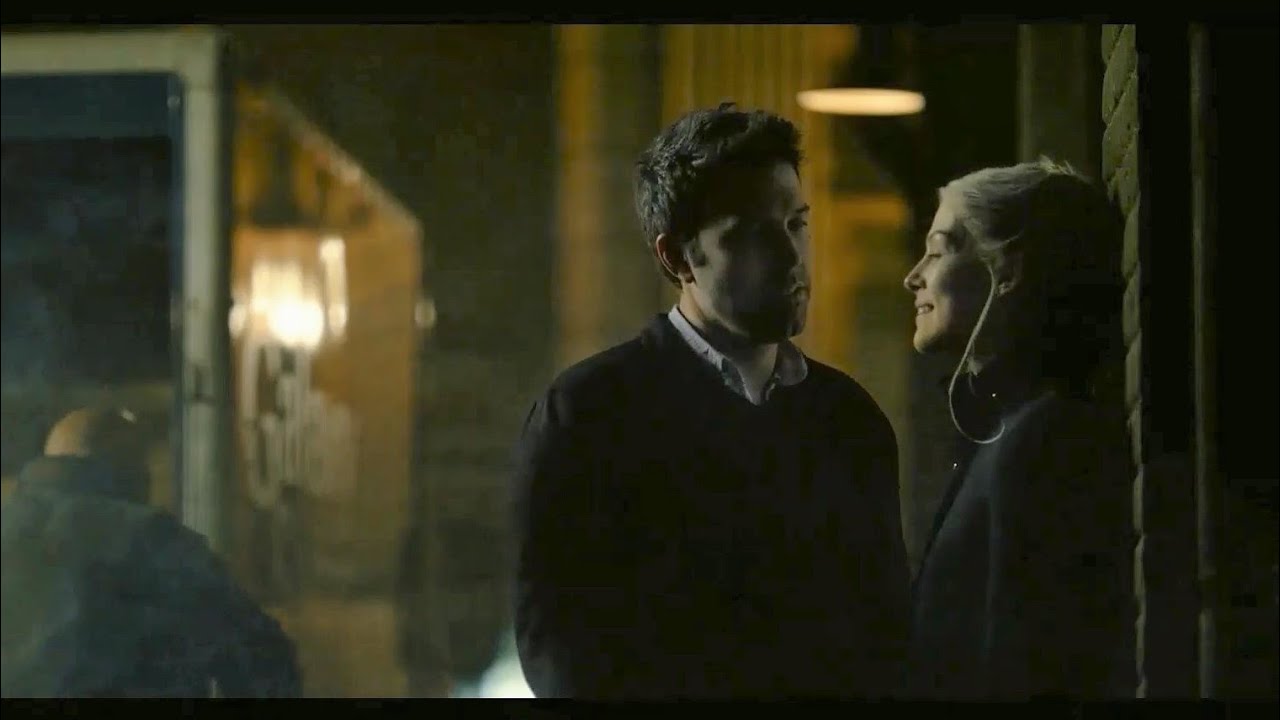🎬 Gone Girl (2014)

Gone Girl (2014) – A Masterpiece of Psychological Thrillers
Introduction
David Fincher’s Gone Girl (2014) is a psychological thriller that masterfully explores the themes of deception, media manipulation, and the dark complexities of marriage. Based on Gillian Flynn’s bestselling novel of the same name, the film delivers an intense and unsettling narrative that keeps audiences on edge from start to finish.
With powerful performances from Ben Affleck and Rosamund Pike, combined with Fincher’s meticulous direction, Gone Girl transcends the conventional mystery thriller genre. But what makes this film so captivating, and why does it continue to resonate with audiences even years after its release? Let’s dive into an in-depth review of Gone Girl and analyze its storytelling, cinematography, performances, and underlying themes.
Plot Summary
Nick Dunne (Ben Affleck) and Amy Dunne (Rosamund Pike) appear to be the perfect couple—intelligent, attractive, and deeply in love. However, on their fifth wedding anniversary, Amy mysteriously disappears, leaving behind clues that suggest foul play. As the police investigation unfolds, Nick quickly finds himself in the media spotlight, portrayed as the prime suspect in his wife’s disappearance.
The case takes a dramatic turn when Amy’s diary is discovered, revealing a troubled marriage filled with financial struggles, infidelity, and abuse. Public perception turns against Nick, but as more evidence comes to light, the truth becomes far more sinister than anyone could have imagined.
With shocking twists, unreliable narration, and a darkly satirical take on media sensationalism, Gone Girl keeps audiences questioning every character’s motives until the very end.
Direction and Cinematic Style
David Fincher, known for his meticulous storytelling and atmospheric direction, brings Gone Girl to life with his signature dark and moody aesthetic. The film’s visual style plays a crucial role in enhancing its psychological tension:
- Muted color palette: The use of cool, desaturated tones creates an eerie and unsettling atmosphere, mirroring the film’s themes of emotional detachment and deception.
- Precise framing and cinematography: Every shot is carefully composed, reflecting the characters’ psychological states and emphasizing the film’s themes of control and manipulation.
- Fincher’s signature pacing: The film balances slow-burning tension with rapid-fire revelations, keeping the audience engaged while maintaining a sense of unease.
Trent Reznor and Atticus Ross’s haunting score further enhances the unsettling tone, making even mundane scenes feel ominous and unpredictable.
Performances and Character Analysis
Rosamund Pike as Amy Dunne
Rosamund Pike delivers a career-defining performance as Amy Dunne, portraying her as both a vulnerable victim and a cold, calculating mastermind. Her transformation throughout the film is chilling, making Amy one of the most compelling and unforgettable characters in modern cinema. Pike’s performance captures Amy’s complexity—her charm, intelligence, and terrifying ability to manipulate those around her.
Ben Affleck as Nick Dunne
Ben Affleck’s portrayal of Nick Dunne is equally impressive. He embodies the role of a man caught in an impossible situation—both guilty and innocent in different ways. Affleck’s subtle expressions and restrained performance add layers to Nick’s character, making him sympathetic yet suspicious at the same time.
Supporting Cast
- Carrie Coon as Margo Dunne: Nick’s supportive yet skeptical twin sister, Margo serves as the audience’s voice of reason, grounding the film in reality.
- Neil Patrick Harris as Desi Collings: Desi’s obsessive and unsettling presence adds another layer of psychological tension to Amy’s already complex story.
- Tyler Perry as Tanner Bolt: As Nick’s defense attorney, Bolt brings a sharp wit and strategic mind to the legal battle, showcasing the role of media manipulation in shaping public perception.

Themes and Symbolism
Beyond its surface-level mystery, Gone Girl delves into deeper themes that reflect societal issues:
1. The Power of Media Manipulation
The film critiques the sensationalist nature of modern media, highlighting how easily narratives can be shaped and distorted. Nick’s portrayal in the news shifts from grieving husband to prime suspect almost overnight, showcasing how public perception can be controlled by selective storytelling.
2. The Illusion of the Perfect Marriage
Nick and Amy’s relationship serves as a commentary on the unrealistic expectations placed on marriage. Amy’s famous “Cool Girl” monologue exposes the pressures women face to conform to idealized versions of themselves, only to be discarded when they no longer fit that image.
3. Gender Dynamics and Societal Expectations
The film raises important questions about gender roles and societal expectations. Amy’s actions challenge traditional notions of victimhood and villainy, forcing the audience to reconsider preconceived notions about relationships and power dynamics.
4. Control and Manipulation
Both Nick and Amy manipulate those around them, but Amy takes control to an extreme level. Her meticulously crafted plan demonstrates how intelligence and strategy can be weaponized, making her one of the most formidable characters in thriller history.
Twists and Ending Explained
One of Gone Girl’s greatest strengths is its ability to subvert audience expectations. Just when viewers believe they understand the truth, the film introduces another shocking revelation.
The final act, in which Amy returns home after framing Desi for her kidnapping, is one of the most unsettling and brilliant twists in modern cinema. The power dynamic between Nick and Amy shifts dramatically, leaving audiences questioning who truly has the upper hand. The film ends on an ambiguous note, reinforcing the idea that their toxic relationship is an unbreakable cycle—one built on mutual deception and control.
Cultural Impact and Legacy
Since its release, Gone Girl has had a lasting impact on both the thriller genre and popular culture. It sparked discussions on gender roles, marriage dynamics, and media influence, solidifying its place as one of the most thought-provoking films of the 2010s. Amy Dunne’s character has become a cultural icon, with her monologues and manipulative tactics frequently analyzed and referenced in film discussions.
The film’s success also paved the way for a resurgence of psychological thrillers centered on complex female protagonists, influencing later works like The Girl on the Train (2016) and Sharp Objects (2018).
Final Verdict
Pros:
- Masterfully directed with a gripping narrative
- Outstanding performances, especially from Rosamund Pike
- Thought-provoking themes and social commentary
- Unpredictable twists that keep viewers engaged
- Visually stunning cinematography and atmospheric tension
Cons:
- Some plot elements may feel overly dramatic or exaggerated
- The slow-burn pacing might not appeal to all viewers
Overall Rating: 9.5/10
Gone Girl is a must-watch for fans of psychological thrillers, offering a chilling exploration of marriage, media, and manipulation. With its unforgettable characters, shocking twists, and masterful storytelling, it remains one of the most compelling films of the decade. Whether you’re revisiting it or watching for the first time, Gone Girl is guaranteed to leave you questioning everything you thought you knew about trust and deception.
Conclusion
Few films manage to blend psychological depth, social commentary, and nail-biting suspense as effectively as Gone Girl. It is a film that lingers in the mind long after the credits roll, challenging viewers to question the stories they believe and the relationships they trust. If you haven’t seen it yet, prepare for a dark and thrilling ride into the heart of modern relationships and media-driven narratives.